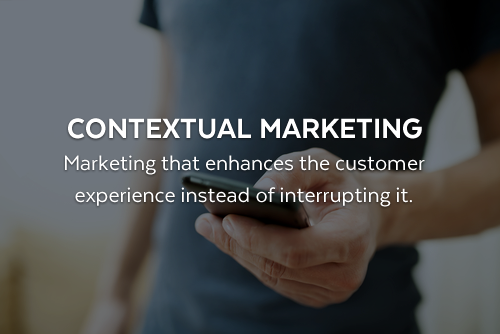
Contextual Marketing: You may or may not have heard of this marketing buzzword, but I can guarantee you have experienced it firsthand via your Amazon or Instagram account.
Perfect example: you’re shopping around online for a new pair of gym shoes, or checking out the latest posts of a famous body-builder extraordinaire, and suddenly gym apparel ads are appearing out of nowhere on your facebook feed. This, in a nutshell, is Contextual Marketing.
What is Contextual Marketing?
According to Hubspot, the definition of contextual marketing is to “personalize a user's experience on your website based on who they are and what they're looking for. “ It’s a marketing model that presents users with targeted ads based on their most recent browsing behavior. Tricky yes, but also so smart.
 If you’ve noticed certain online ads are surprisingly close to home, it’s not a coincidence- it’s science. Any time a user performs a Google search or clicks on an article, there’s a software program recording it. Companies such as Sitecore and Socialears are dedicated to this customer experience management, and their purpose is bringing audience awareness of your content to the masses.
If you’ve noticed certain online ads are surprisingly close to home, it’s not a coincidence- it’s science. Any time a user performs a Google search or clicks on an article, there’s a software program recording it. Companies such as Sitecore and Socialears are dedicated to this customer experience management, and their purpose is bringing audience awareness of your content to the masses.
In the past, companies would create ads and blindly put on random websites, hoping for traction--a costly and time consuming gamble that did not always prove to be successful. Often, the ads sent to audiences made no sense for their demographic: i.e., a teenage high schooler being offered deals on baby carriers.
Today, if a user shows interest in a specific type of content, contextual marketing maximizes returns by offering relevant ads a potential customer would most likely click on. In this way, contextual marketing is effective because it can decrease customer annoyance and eliminate unprofitable ads (showing low or negative return on investment). With contextual marketing, you send the right content, to the right person, at the right time.
SEE ALSO: Why Content Marketing Matters for Your Business
Similarly, with contextual marketing you can receive real-time information such as physical locations, know what social platforms the user is on, and even the local weather of where the user is at. All this technology can help your company by influencing the user more effectively, which in the long run means better ROI for you.
How to Get Started with Contextual Marketing
Ready to try this whole context thing? Here’s how:
- Segment your audiences. You already know that blasting your entire customer database with the same contact is email suicide, but you will need to dive down further into the data and hyper-segment your lists. Using your preferred marketing automation software, make sure you are grouping your recipients based on their buyer preferences, demographics and needs—aka, by your buyer personas). That way, the customer receiving the email has a better chance of not only opening, but clicking thru the content because they're interested in it.
- Make sure you are providing a dynamic CTA for content on your website. This seems pretty obvious, but you’ll be surprised what type of information you can get from a user looking to read a blog or check out a webinar.
- Consider using a smart form. A smart form is setup to support various devices, and can will allow you to change an entire form depending on your website visitor. Using some very cool technology, smart forms automatically fill out the content fields that users have already filled out on your website in the past, so they don’t have to keep re-entering the same information.
Utilizing this data will help you to see which products and services are best suited for your audience. Remember, social media is your friend here - it’s the best way to promote your content, especially through visuals. Studies show that “visual Facebook posts get 53% more likes than plain text posts, and image-based Instagram has surpassed Twitter in daily users.” Make sure to do your research and see which platform the majority of your audiences spend their most time on.
SEE ALSO: 5 Foolproof Ways to Improve Your Marketing Strategy
For more an in depth look at Contextual Marketing, Hubspot offers a fun certification class you can take, or head over to the Sitecore page and request your free copy of Context Marketing For Dummies. Similarly, if you are looking for assistance building out your own contextual marketing campaign, contact EYEMAGINE for a free consultation.


